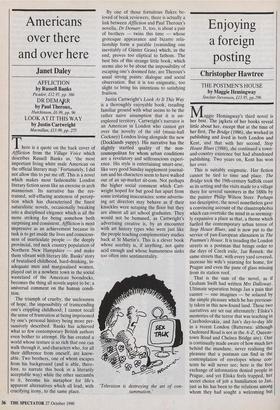Americans over there and over here
Janet Daley
AFFLICTION by Russell Banks
Picador, £12.95, pp, 366
DR DEMAitit by Paul Theroux,
Hutchinson, £6.99, pp. 96
LOOK AT IT THIS WAY by Justin Cartwright
Macmillan, f13.99, pp. 275
T here is a quote on the back cover of Affliction from the Village Voice which describes Russell Banks as, 'the most important living white male American on the official literary map.' Fortunately, I did not allow this to put me off. This is a novel which makes most fashionable London literary fiction seem like an exercise in arch mannerism. Its narrative has the res- trained, self-effacing acuteness of percep- tion which has characterised the finest naturalistic novels, occasionally breaking into a disciplined elegance which is all the more striking for being somehow both surprising and consistent. Affliction is most impressive as an achievement because its task is to get inside the lives and conscious- ness of inarticulate people — the deeply provincial, red neck country population of Northern New Hampshire — and make them vibrant with literary life. Banks' story of brutalised childhood, hard-drinking, in- adequate men and marginalised women, played out in a nowhere town in the social wasteland of the American boondocks, becomes the thing all novels aspire to be; a universal comment on the human condi- tion.
The triumph of cruelty, the uselessness of hope, the impossibility of transcending one's crippling childhood; I cannot recall the sense of frustration at being imprisoned by one's personal history being more per- suasively described. Banks has achieved what so few contemporary British authors even bother to attempt. He has created a world whose texture is so rich that one can walk through it, and characters who, for all their difference from oneself, are know- able. Two brothers, one of whom escapes from his background (and is able, there- fore, to narrate this book in a literarily acceptable way) while the other succumbs to it, become his metaphor for life's apparent alternatives which all lead, with crucifying irony, to the same place. By one of those fortuitous flukes be- loved of book reviewers, there is actually a link between Affliction and Paul Theroux's novella, Dr Demarr. It, too, is about a pair of brothers — twins this time — whose grotesque appearance and bizarre rela- tionship form a parable (reminding one inevitably of Giinter Grass) which, in the end, proves too eliptical to fathom. The best bits of this strange little book, which seems also to be about the impossibility of escaping one's doomed fate, are Theroux's usual strong , points: dialogue and social observation. But it is too enigmatic, too slight to bring his intentions to satisfying fruition.
Justin Cartwright's Look At It This Way is a thoroughly enjoyable book, treading familiar ground with what seems to be the rather naive assumption that it is un- explored territory. Cartwright's narrator is an American in London who cannot get over the novelty of the old (music-hall Cockney) London living alongside the new (Docklands yuppy). His narrative has the slightly startled quality of the non- cosmopolitan for whom urban conditions are a revelatory and selfconscious experi- ence. His style is entertaining smart-arse, like very good Sunday supplement journal- ism and his characters seem to have walked out of an up-market sit-com. Not perhaps the higher social comment which Cart- wright hoped for but good fun apart from some irritating inaccuracies: some advertis- ing art directors may behave as if their knuckles were scraping the floor but they are almost all art school graduates. They would not be bemused, as Cartwright's advertising creative is, by an encounter with art history types who were just like the people teaching complementary studies back at St Martin's. This is a clever book whose acerbity is, if anything, not quite acid enough and whose humaneness sinks too often into sentimentality.
'Television is destroying the art of con- summation.'


































































 Previous page
Previous page